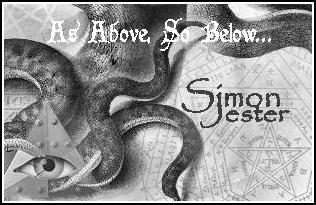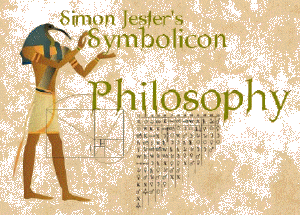The Need for Tradition
In Magical Learning
by Simon Jestercopyright 2010 Given everything I say elsewhere about the subjective nature of the Paths on the Tree of Life and the multiplicity of magical systems, I still believe that learning a particular tradition and incorporating its insights into ritual practice is a necessary step for anyone beginning to study ritual magic. Some people disagree with this. They argue that magic involves a turning inward toward one's own depths in order to discover and learn the highly individualistic grammar and syntax of one's personal myth, and go on to conclude that the study of other people's magical systems and methods, such as those expounded by the Golden Dawn, the O.T.O., and various Wiccan traditions, is therefore unnecessary to one's magical development.
While I wholeheartedly agree with the idea that students of magic must explore, learn and use their own personal symbolism, I have observed that becoming well versed in some accepted tradition provides the necessary fulcrum that gives such individualistic elements their power. I am not saying that people should blindly follow the tenets of any group or school of thought, but I am contending that clay needs to be formed in order for it to become sculpture. The raw Prima Materia of the Great Work requires a lot of alchemical processing and structuring before it can be transformed into the Stone of the Wise.
In contemporary magical literature, Chaos Magic has become very popular, and its many exponents describe their non-traditionally based methods of creating sigils, talismans, thought forms, and spontaneously emergent rituals. Turning to the subjective sources of myth, they often reject traditional systems of magic as being overly conservative and stifling (which some of them can be) and try to do their "own thing." Although I admire the creative energy that motivates such behaviors, and even employ Chaos methods within the context of my own practice, I sometimes find myself worrying about the long-term consequences that too much emphasis on such procedures can entail. I've worked for 23 years as a professional psychotherapist for a local mental health agency, and in that time have encountered what amount to very extreme examples of Chaos Magic. People come to my agency with well-developed personal systems. They employ their own unique vocabularies consisting of magic words called neologisms; perform highly individualistic rituals to an obsessive-compulsive degree; and have experiences in which various entities speak or appear to them and advise them to do all sorts of things that either amuse or alarm their neighbors and families. These people are usually completely socially dysfunctional, and any "message" they attempt to communicate is typically misunderstood because it can't be translated into a shared vocabulary based on consensual experience. The technical term for this unfortunate condition is schizophrenia, and people caught up in its obsessions and delusions lead lives of painful alienation. They have taken Chaos Magic to frightening extremes.
My friends who practice Chaos Magic are by now bristling with indignation. "Magic has always been akin to madness," they will say. And I completely agree. But magic is controlled madness, and some exponents of Chaos methods often ignore (or even denigrate) the need for such control. At its worst, Chaos Magic can sometimes provide an excuse for self-indulgence and a lack of personal discipline. In magic, such character traits inevitably block the attainment of valuable practical results. I'm not saying that the exclusive practice of Chaos Magic leads to psychosis, but I do believe that it can end in a state of self-delusion and personal isolation that is inimical to the development of real magical power. The subjective creative output of the Chaos Magician—the molten Prima Materia that Chaos Magic is so effective at uncovering-- needs to be poured into intersubjective molds in order to gain any relevance or even effectiveness beyond the limited subjectivity in which it initially arises.
An analogy might be helpful at this point. Hydrogen is a substance with immense potential energy. You can generate this gas easily in a laboratory, fill a child's balloon with it, and detonate it with an Aim & Flame. You'll get an impressive bang, a little water…and not much else. But if you want to utilize the energy of hydrogen more efficiently, you have to employ highly structured techniques for containing and controlling it. Employ a method to pressurize and liquefy hydrogen, fashion a rocket engine to hold and compress its energy, install the engine in an aerodynamically designed rocket stage equipped with an internal guidance system, and you can travel to the planets. Analogically speaking, your subjective experience provides the hydrogen needed to power magical operations. Personal discipline enables you to pressurize and intensify its energy. When you assimilate this disciplined experience into a particular magical tradition, you are placing your hydrogen-burning engine inside a spaceship and lifting off for the stars. Without the engine and the rocket, however, your hydrogen will simply dissipate without accomplishing anything of much worth.
In terms of practical advice to students beginning their education in magic, the most effective procedure is to start by familiarizing themselves with several different mainstream traditions: Golden Dawn, Thelema, Gardnerian Wicca, etc. You will find that you naturally drift more toward one of these traditions than to the others. This indicates that, at some deep level, this particular tradition embodies a form that matches your current needs, whatever they might be. The student should then focus on that tradition by studying its doctrines and learning its particular sets of correspondences and ritual formats, while simultaneously remaining open-minded to the reality that there are other equally valid approaches to magic.
Naturally, students who adopt this time-honored procedure will encounter aspects of their chosen tradition that don't perfectly dovetail with their own inner vision. However, all desires to change the tradition, to alter its correspondences and creatively augment its ritual forms along more personalized lines should be resisted until the student has gained a reliable degree of skill and proficiency in the particular system. This is just common sense. You certainly wouldn't want to make changes in the structure of a liquid hydrogen fueled rocket engine until you thoroughly understood how it worked. Otherwise, nasty explosions could result! Students often discover that certain apparently meaningless or disagreeable aspects of a magical tradition become very meaningful after they have taken the time to learn more about that tradition.
Once mastery of a system is attained, it becomes acceptable to begin interjecting personal elements, such as creating one's own rituals or altering Tarot correspondences with Paths on the Tree of Life. The important thing to note, however, is that changes made after a system is thoroughly learned usually arise from within that system. In spite of even major differences, they employ a shared symbolic vocabulary that makes them comprehendible to other practitioners. Think of Crowley's reassignment of the Hebrew letters Tzaddi and Heh to different Tarot cards, or his incorporation of the unicursal hexagram into rituals. These were significant changes, but all arose within the magical vocabulary of the Golden Dawn system in which Crowley was originally trained, and could be explained in meaningful ways with the terms and metaphysical concepts employed by that organization. Proceeding in this fashion, Crowley gave objective changes in meditative practice and ritual format an intersubjective accessibility (which is the very quality that the overly subjective schizophrenic systems mentioned above lack.) Since the intersubjective dimension provides a major key to that level of the Astral world on which magic must operate in order to be effective, those who wish to abandon all traditions in favor of spontaneous, subjective emoting should take note.
Students of the Qabala always point out that there are three pillars on the Tree of Life: the right hand Pillar of Force, the left hand Pillar of Form, and a central Pillar that balances and harmonizes the activities of the other two. Such balance and harmony is the goal of magic. Personal, subjective elements—e.g., dream symbolism, spontaneous visionary experiences, inspirations, insights, and experiments with personalized changes—derive from the energetic right hand Pillar and must be filtered through the left hand Pillar's formative systems in order to attain balance and relevance. Objective elements—e.g., conceptualized systems, symbolic vocabularies, doctrines, methods, and ritual formats—must admit currents of creative right hand Pillar energy in order to avoid becoming lifeless empty shells. Immanuel Kant (who was perhaps more influenced by the Qabala than has ever been suspected) put the matter quite succinctly when he wrote: "Concepts without percepts are empty. Percepts without concepts are blind."

